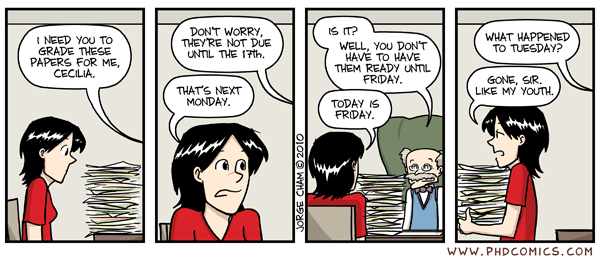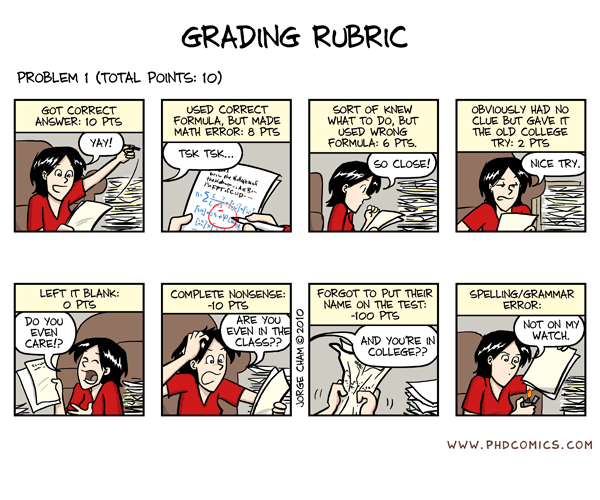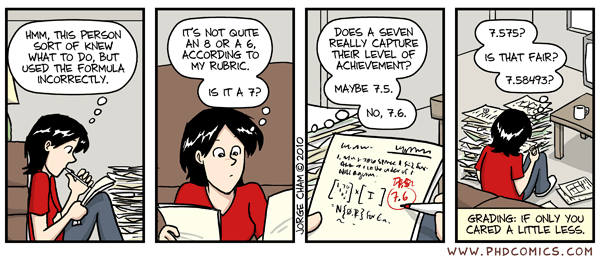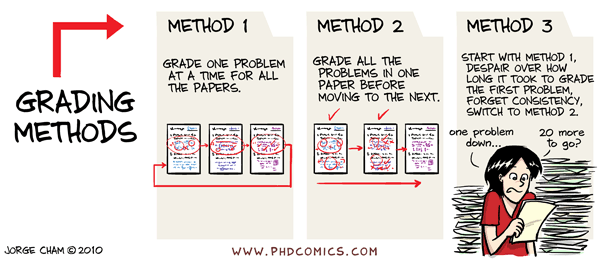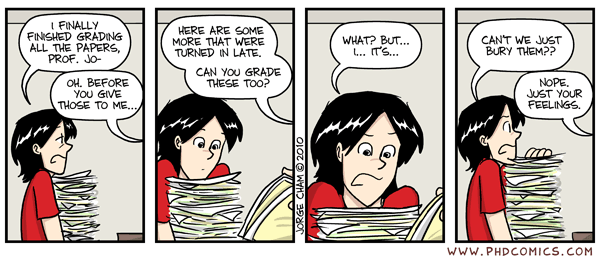… and since I finished my marking today, here are The Simpsons and PHD Comics on the typical graduate student’s lot in life in May and June:
Lost
The last 20 minutes of the last episode of the last season were the only 20 minutes I watched.
Conclusion: Americans are so f’ing religious.
The last 20 minutes of the last episode of the last season were the only 20 minutes I watched. Conclusion: Americans are so f'ing religious.
An astonishing victory for the Liberal Democrats
Well, I am impressed. The Lib Dems have obtained everything and more that I predicted yesterday. I couldn’t be happier. I’m astounded that the Lib Dems have achieved so much or that the Conservatives were prepared to concede so much. Congratulations are due to both Cameron and Clegg. This is a sensible, grown-up result. Full details of the coalition agreement are yet to be released (they will at 2pm London time), but it looks like:
The Cabinet
- Lib Dems to have five (!) seats in the cabinet, including deputy PM for Clegg.
Electoral Reform
- Fixed term (five year) parliament, with the next election to be held on the first Thursday of May, 2015 [Lib Dems].
- Adjustments to electoral boundaries to equalise the constituency sizes [Tories].
- A referendum on Alternative Vote — a.k.a. Preferential Voting — for the House of Commons [Lib Dems].
- Proportional Representation for the House of Lords! [Lib Dems]
Fiscal Policy
- An emergency budget within 50 days [Tories].
- A reduction in spending of six billion pounds for the 2010/2011 year [Tories].
- A gradual raising of the tax-free threshold to £10,000 [Lib Dems].
- Capital Gains Tax increased to match income tax, [Lib Dems] with lower rates for entrepeneurial business investments [Tories].
- Inheritance tax to remain unchanged [Lib Dems].
- The rise in employers’ National Insurance will be scrapped [Tories].
- The rise in employees’ National Insurance will remain to partially fund the increase in the tax-free threshold [Lib Dems].
- Tax cut for married couples will go ahead [Tories].
Europe
- No adoption of the Euro [Tories].
- Referendum on any future treaties that would cede any power to Brussels [Tories].
Immigration
- A limit on non-EU immigrants to the UK [Tories].
Security
- Trident gets replaced [Tories].
Financial Regulation
- Macroprudential regulation to be at the Bank of England [Tories].
- Microprudential regulation to be decided later (i.e. the FSA may not be dismantled) [Lib Dems].
- An independent commission to consider breaking up the biggest banks [Lib Dems].
Energy
- No agreement on nuclear power, but a Lib Dem will be secretary of state for the environment [Lib Dems].
15:17 I predict a Conservative-LibDem coalition
The Labour and Liberal Democrat negotiating teams finished a session around 13:30. The Conservative negotiation team then sat down with the Lib Dems at 14:00. Ever since then, there has been a steady stream of increasingly-senior Labour figures arguing against a Lab-Lib coalition, which suggests to me that they’re softening up the ground for a Tory-led government.
From the BBC Live stream:
14:26 Labour MP and former minister Michael Meacher says his party should go into opposition and “renew itself”.
14:30 The first Labour minister has openly expressed the feeling that a Lab-Lib coalition is not viable.
14:36 “We must NOT enter a deal with Labour,” writes Keith Nevols, former Lib Dem parliamentary candidate, on his blog.
14:43 The London Evening Standard’s Paul Waugh claims that in last night’s cabinet meeting Health Secretary Andy Burnham “broke ranks to give an ominous warning of the dangers of trying to concoct such an unstable alliance” between Labour and the Lib Dems.
15:12 Labour MP for Batley and Spen Mike Wood says “David Cameron should be PM”.
My prediction:
A Conservative-Liberal Democrat coalition, with major points along the lines of:
- Strong support for Tory spending (cut) plans;
- Freedom for the Lib Dems to oppose the Tory line on Europe and Trident, at the least;
- Some mechanism to equalise the size of constituencies (which would help the Tories);
- A referendum on Alternative Vote — a.k.a. Preferential Voting — for the House of Commons (which would help the Lib Dems);
- No agreement on reform of the House of Lords;
- The Lib Dems getting one mid-to-high level cabinet position (something like Home Secretary); and
- An intention to keep the new parliament for at least two years.
The Lib Dems will desperately want two things:
- to have electoral reform enacted (presuming that they succeed in the referendum) before the next election; and
- to have an opportunity to be seen to be actively influencing policy in their favour.
Of course, the Liberal Democrats have their Southport resolution. Any coalition must obtain 75% support amoung Lib Dem MPs, members of the House of Lords and executives of the party. Nevertheless, I think that they’ll pull it through. If nothing else, the prospect of the first Lib Dem cabinet position in a century will awaken the real politik in their MPs.
Previously on the UK electoral system:
Reblog: Cranial Heat Sink
Hey, if you can retweet, you can reblog. Jeff Ely:
Tyler Cowen tweeted:
Why do chess players hold their heads hard, with their hands, when they are thinking? If it works, why don’t more thinkers do it?
To prevent overheating of course. You’ll notice that they typically extend their fingers and cover their foreheads which is the hottest part. They are [unconsciously] maximizing surface area in order to increase heat dissipation.
Here is a suggestion for how to super-cool your cranium and over-clock your brain. On a more serious note, here is a pipe that is surgically implanted in the skull of epileptics to reduce the intensity of seizures.
British vs. Australian electoral systems
How the Australian electoral system is better than the British
- Mandatory voting
- A democratically elected upper house
- Preferential voting in the lower house, proportional in the upper (no first-past-the-post)
- The electoral commission adjusts the electoral boundaries every cycle
- Elections are always on a Saturday so that everyone has time to get to the polling stations
- Elections in all seats are administratively run by the Electoral commission
How the British electoral system is better than the Australian
- The electoral cycle is longer. Australia’s 2-to-3 years is too short.
How they both suck
- Variable term limits. There should be fixed term limits. 4 years in the lower house, 8 years in the upper (half re-elected each time).
I always thought of it as Engrish
The NY Times, writing about Shanghai’s efforts to improve it’s signs, has a gallery of amusing mis-translations from Chinese to English. This was one of my favourites:
As an aside, I like the javascript-free technique used by the NYT developers to prevent most people from saving the images. Here is the relevent section of the page’s HTML source:
<div class="centeredElement" style="background-image:url('http://graphics8.nytimes.com/images/2010/05/03/world/20100503_CHINGLISH-slide-DFXB/20100503_CHINGLISH-slide-DFXB-slide.jpg');width:600px; height:400px;"> <img width="600" height="400" src="http://graphics8.nytimes.com/images/misc/pixel.gif" /> </div>If somebody right-clicks on the dispayed image (technically, the background image) and chooses to view it or save it, they get pixel.gif, which is a 1×1 clear pixel.
The perverse incentives of Queensland traffic law
In the Australian state of Queensland, a violation of traffic law is punished by a fine and the awarding of points. Points for a conviction stay on your licence for three years. If you ever have 12 points at the same time, you’re in trouble. I’ll come to that in a moment.
Somebody I know, let’s call him Semaj, has recently got himself up to 11 points. He doesn’t dispute that he broke the law for all of them; he did. Most of them came from speeding, but the last three points came from driving through a yellow light. In Queensland, just like everywhere else on the planet, you must stop at a red light; but for a yellow light, you must stop if you are safely able to do so. Some people believe that the yellow light should just be to warn drivers that the red is coming and have no penalty tied to it, but that’s not what I want to focus on. To really rub salt in the wound, the light was still yellow when Semaj left the intersection and the only other car in the area was that of the police officer that booked him. That’s what those in the business call a “dick move” by the cop, but it’s not what I want to focus on either. What I want to focus on is …
***
Perverse incentive #1
The punishment for not stopping for a yellow light when you were safely able to is the same as that for not stopping at a red light: AU$300 and 3 points. This is absurd, because it fails to make the punishment proportionate to the severity of the crime. By doing so, the government offers an incentive to people to treat them as equivalent. To illustrate the point, let me take the idea embedded here in Queensland law to a logical, but ridiculous conclusion:
The violation of all laws should be punishable by the same penalty. A serial rapist-murderer should be locked away for life. Therefore, overstaying your parking for just one minute should lead to your being locked away for life.
See? Absurd. Clearly there are gradations of severity and, just as clearly, there should be corresponding gradations of punishment. If the punishment for running a red light is a fine and 3 points, then the punishment for running a yellow should be a smaller fine and 1 point.
***
Anyway. Moving on. Semaj now has 11 points on his licence. The oldest of his points is only one year old, so he has two full years before any of them are removed. If he gets even a single point over the next two years, he will be faced with the following choice when he turns up at the Department of Transport to pay his fine:
- either give up his licence for three months;
- or go on a probationary licence (with a limit of two points instead of 12) for a full year.
After this, he will be returned a regular full licence entirely clear of points. Hopefully you can now see …
***
Perverse incentive #2
Semaj is in a position where he would be better off by breaking the law. The government is giving him an incentive to break the law. If Semaj follows the law, he will have a one-point buffer for two years, then a three-point buffer for a year before returning to a full licence. That’s three years in total. If he deliberately gets caught for a one point infraction tomorrow, he can have a two-point buffer for one year and then go immediately to a full licence. The cost to him will just be the fine for tomorrow’s infraction; maybe $100.
Who wouldn’t take that option? It’s crazy. If you’re going to have a point system with the possibility of a probationary licence, then the length of the probationary period should be long enough that someone in Semaj’s position wouldn’t actually prefer to be on it.
***
As I’ve said before, I believe that all fines issued for misdemeanours should not be for a fixed amount, but for a percentage of the transgressor’s income. When faced with the prospect of a $400 fine, somebody earning $20,000 a year will pay attention, but somebody earning $200,000 will not care nearly as much. The two people therefore face different incentives when it comes to obeying the law.
Of course, none of this comes close for the most ridiculous traffic law in Queensland. That most dubious of prizes goes to this piece of nanny-state-run-amok trash: Drivers on P-plates (that’s a “provisional” licence) “under 25 years of age can only carry one passenger under the age of 21 years who is not an immediate family member, when driving between 11pm on a day and 5am on the next day.”
For reference, the very earliest that somebody in Queensland can move from a provisional to a full licence is at the age of 20. That is two or three years into university. Most Queenslanders, if they go to university and don’t take a gap year, would turn 21 in their fourth year.
The “peer passenger restriction” of provisional licences is designed to prevent distraction (from drunk louts in the back seat) to the driver and so, presumably, lead to fewer accidents and thus fewer fatalities. Whether it ultimately succeeds in reducing road deaths is an empirical question. I don’t have access to the data, but to my mind there’s a fair possibility that we’ll actually see more road deaths from this, because …
***
Perverse incentive #3
By forcing university-age people to not share a car, the Queensland government is:
- abandoning the idea of a designated driver; and
- encouraging more traffic onto the roads at just the time of day when people are least likely to pay full attention to the road (what, did they think that those kids would stay home?).
Both of those effects will serve to push up the accident (and thus, fatality) rates.
If you want to keep drunk 20-year-olds off the roads, then give them a way to avoid them. Improve public transport. Lift the licencing restrictions on taxis.
***
Idiots.
Why electoral boundaries favour Labour and why electoral reform would favour the Liberal Democrats
Brief answers to three questions about elections in the United Kingdom:
- Why do electoral boundaries favour Labour?
- Why would moving to Proportional Representation favour the Liberal Democrats?
- Why would moving to Alternative Vote/Instant Runoff/Preferential Voting favour the Liberal Democrats?
Why the current seat allocation is biased towards Labour
Two reasons:
Firstly, it’s because of demographics, migration and the timing of boundary changes. There’s a long-term trend across most of the country (excluding London) for people to be moving away from inner city areas and towards suburban, semi-rural and rural areas. On average, that represents a movement of Labour-party supporters into Conservative seats. As a result, the inner city areas remain staunchly pro-Labour, but the suburban and semi-rural areas become contested. Under British law, electoral boundaries are only updated very rarely. Quoting ukpollingreport.co.uk:
Because the effect of boundary changes is one way, any delay in keeping the boundaries up to date with population movements tends to be to the advantage of the Labour party and the disadvantage of the Conservatives.Currently, Parliamentary boundary reviews are based on the electorates at the time the boundary review commences (unlike local authorities boundaries, which are based on projections of the future electorate). In the case of the boundaries which will be used for the next election, the review began in 2000, so by the time the boundaries are first used in 2009/10 they will already be a decade out of date. By the time they are replaced by the next boundary review, due to report between 2014 and 2018, they will be close to 20 years out of date.
Secondly, there are different rates of turnout across different seats. The poor and poorly educated correlate positively with Labour support and negatively with turning out to vote.
To appreciate what this means, suppose that you had two seats with equal numbers of people living in them (contrary to the demographics mentioned above); one generally pro-Labour and the other generally pro-Tory. Let’s say that they each win 60-40. On election day only 25% of eligible voters turn up in the pro-Labour seat, but 75% of eligible voters turn up in the pro-Conservative seat. That will produce one Labour MP and one Tory MP (50% each), but when combined, the Conservatives will have received 60%*75% + 40%*25% = 55% of all the votes cast.
When combined with the demographic changes, this adds up to a significant advantage for Labour. Obviously the second distortion (but not the demographic one) vanishes if you introduce compulsory voting like we have in Australia.
How Proportional Representation would help the Lib Dems
This one is easy to explain:
- In 1992, the Lib Dems received 17.8% of the total vote, but only 3.1% of the seats in parliament.
- In 1997, the Lib Dems received 16.8% of the total vote, but only 7.0% of the seats in parliament.
- In 2001, the Lib Dems received 18.3% of the total vote, but only 7.9% of the seats in parliament.
- In 2005, the Lib Dems received 22.6% of the total vote, but only 9.5% of the seats in parliament.
- According to the fivethirtyeight.com forecast, this week the Lib Dems will receive 28.7% of the total vote, but only 18.4% of the seats in parliament
How Alternative Vote/Instant Runoff/Preferential Voting would help the Lib Dems
Two reasons:
Firstly, with first-past-the-post, Lib Dem supporters have an incentive to vote for someone else so that their vote “counts”. This effect is particularly strong in contests that are perceived to be close (so it’s less of a concern this time).
Secondly, the Lib Dems do well when you ask people to rank their preferences – they’re rarely 1st, but they’re frequently 2nd. To really understand how this would affect things, have a look at the transition matrix fivethirtyeight.com uses in their prediction. This is their matrix for how they believe people have changed relative to 2005 (e.g. of previous Labour voters, 62% remain with Labour, 9% have switched to the Tories, 13% to the Lib Dems, etc):
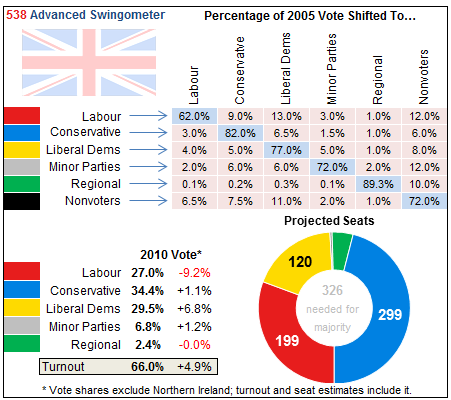 It is therefore not really a matrix of average preferences, but it gives an idea of what it might be.
It is therefore not really a matrix of average preferences, but it gives an idea of what it might be.
When Labour supporters switch, they favour the Lib Dems over the Tories 13/9 = 1.44
When Tory supporters switch, they favour the Lib Dems over Labour 6.5/3 = 2.17
When Lib Dem supporters switch, they narrowly favour the Tories over Labour 5/4 = 1.25
So, with preferential voting and pretending that there are only the three parties contesting each seat:
If a Lib Dem candidate is in the top two after the first round of voting, they can be confident of receiving the majority of the preferences of the supporters of the 3rd ranked candidate, no matter who they were.
But that can’t be said for the other two parties. If a Labour or Tory candidate is in the twop two after the first round, whether they get a majority of the 3rd-place candidate’s preferences crucially depends on the identity of that 3rd-place candidate. If it was Lib Dem in 3rd place, it’s a flip of the dice. If it was the other big party in 3rd place, they’ll typically get only a minority of the preferences.
On average — over many seats and over several elections — that skewing of preference ranking will act in the Lib Dems’ favour with preferential voting.
